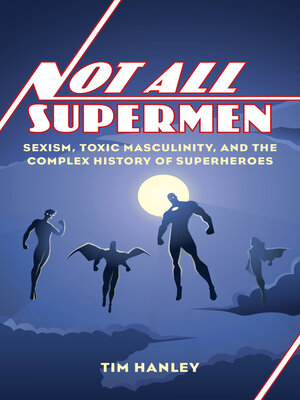Not All Supermen
ebook ∣ Sexism, Toxic Masculinity, and the Complex History of Superheroes
By Tim Hanley

Sign up to save your library
With an OverDrive account, you can save your favorite libraries for at-a-glance information about availability. Find out more about OverDrive accounts.
Find this title in Libby, the library reading app by OverDrive.



Search for a digital library with this title
Title found at these libraries:
| Library Name | Distance |
|---|---|
| Loading... |
An eye-opening exploration of the toxic masculinity and sexism that pervades the superhero genre.
Superheroes have been exciting and inspirational cultural icons for decades, dating back to the debut of Superman in the 1930s. The earliest tales have been held up as cornerstones of the genre, looked upon with nostalgic reverence. However, enshrining these tales also enshrines many outdated values that have allowed sexist gender dynamics to thrive.
In Not All Supermen: Sexism, Toxic Masculinity, and the Complex History of Superheroes, Tim Hanley examines how anger, aggression, and violence became the norm in superhero comics, paired with a disdain for women that the industry has yet to fully move beyond. The sporadic addition of new female heroes over the years proved largely ineffective, the characters often underused and objectified. Hanley also reveals how the genre's sexism has had real-world implications, with many creators being outed as sexual harassers and bigots, while intolerant fan movements are awash with misogynistic hate speech.
Superheroes can be a force for good, representing truth, justice, and courage, but the industry is laden with excessive baggage. The future of the genre depends on what elements of its past are celebrated and what is left behind. Not All Supermen unravels this complex history and shows how superheroes can become more relevant and inspiring for everyone.
Superheroes have been exciting and inspirational cultural icons for decades, dating back to the debut of Superman in the 1930s. The earliest tales have been held up as cornerstones of the genre, looked upon with nostalgic reverence. However, enshrining these tales also enshrines many outdated values that have allowed sexist gender dynamics to thrive.
In Not All Supermen: Sexism, Toxic Masculinity, and the Complex History of Superheroes, Tim Hanley examines how anger, aggression, and violence became the norm in superhero comics, paired with a disdain for women that the industry has yet to fully move beyond. The sporadic addition of new female heroes over the years proved largely ineffective, the characters often underused and objectified. Hanley also reveals how the genre's sexism has had real-world implications, with many creators being outed as sexual harassers and bigots, while intolerant fan movements are awash with misogynistic hate speech.
Superheroes can be a force for good, representing truth, justice, and courage, but the industry is laden with excessive baggage. The future of the genre depends on what elements of its past are celebrated and what is left behind. Not All Supermen unravels this complex history and shows how superheroes can become more relevant and inspiring for everyone.







